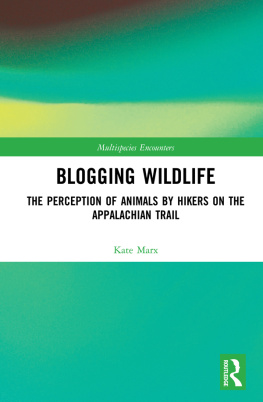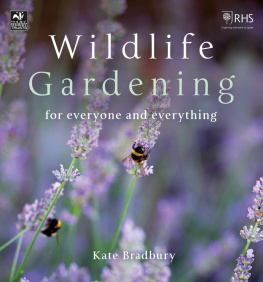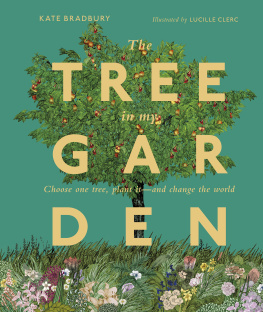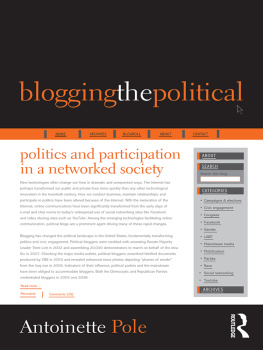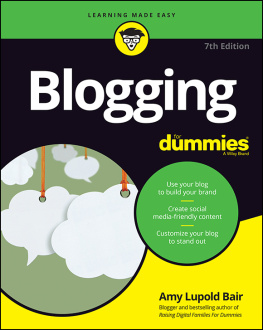Blogging Wildlife
This volume reports on the encounters between hikers and wildlife on the Appalachian Trail. Based on narratives provided by trail hikers, it explores the ways in which humans relate to the animals with whom they temporarily share a home. With attention to the themes of pilgrimage, the changing perception of the animals encountered and reactions to them, risk, auditory experience, and a sense of wildness, the author considers the meaning constituted by nonhuman animals in the context of the walkers narrative journeys. A phenomenologically informed study of the ways in which people perceive wild animals when in an unmediated wilderness setting, how they navigate interactions with them, and how they experience living among them, Blogging Wildlife will appeal to scholars across the social sciences with interests in anthrozoology and humananimal relations.
Kate Marx was a postdoctoral research associate in the research group Exeter Anthrozoology as Symbiotic Ethics (EASE) at the University of Exeter, UK. She is currently Social Research Manager at Waterwise, a not-for-profit organisation which advocates for water conservation in the UK.
Multispecies Encounters
Series editors:
Samantha Hurn is Associate Professor in Anthropology, Director of the Exeter Anthrozoology as Symbiotic Ethics (EASE) working group and Programme Director for the MA and PhD programmes in Anthrozoology at the University of Exeter, UK.
Chris Wilbert is Senior Lecturer in Tourism and Geography at the Lord Ashcroft International Business School at Anglia Ruskin University, UK.
Multispecies Encounters provides an interdisciplinary forum for the discussion, development, and dissemination of research focused on encounters between members of different species. Re-evaluating our human relationships with other-than-human beings through an interrogation of the myth of human exceptionalism which has structured (and limited) social thought for so long, the series presents work including multi-species ethnography, animal geographies, and more-than-human approaches to research, in order not only better to understand the human condition, but also to situate us holistically, as human animals, within the global ecosystems we share with countless other living beings.
As such, the series expresses a commitment to the importance of giving balanced consideration to the experiences of all social actors involved in any given social interaction, with work advancing our theoretical knowledge and understanding of multi-species encounters and, where possible, exploring analytical frameworks which include ways or kinds of being other than the human.
Published
Animal Places
Lively Cartographies of HumanAnimal Relations
Jacob Bull, Tora Holmberg, and Cecilia sberg
HumanCanine Collaboration in Care
Doing Diabetes
Fenella Eason
Living-With Wisdom
Permaculture and Symbiotic Ethics
Alexander Badman-King
Blogging Wildlife
The Perception of Animals by Hikers on the Appalachian Trail
Kate Marx
The full list of titles for this series can be found here: www.routledge.com/Multispecies-Encounters/book-series/ASHSER1436
Blogging Wildlife
The Perception of Animals by Hikers on the Appalachian Trail
Kate Marx
First published 2021
by Routledge
2 Park Square, Milton Park, Abingdon, Oxon OX14 4RN
and by Routledge
52 Vanderbilt Avenue, New York, NY 10017
Routledge is an imprint of the Taylor & Francis Group, an informa business
2021 Kate Marx
The right of Kate Marx to be identified as author of this work has been asserted by her in accordance with sections 77 and 78 of the Copyright, Designs and Patents Act 1988.
All rights reserved. No part of this book may be reprinted or reproduced or utilised in any form or by any electronic, mechanical, or other means, now known or hereafter invented, including photocopying and recording, or in any information storage or retrieval system, without permission in writing from the publishers.
Trademark notice: Product or corporate names may be trademarks or registered trademarks, and are used only for identification and explanation without intent to infringe.
British Library Cataloguing-in-Publication Data
A catalogue record for this book is available from the British Library
Library of Congress Cataloging-in-Publication Data
Names: Marx, Kate, 1981 author.
Title: Blogging wildlife: the perception of animals by hikers on the
Appalachian Trail / Kate Marx.
Description: Abingdon, Oxon; New York, NY: Routledge, 2021. |
Series: Multispecies encounters | Includes bibliographical references and index.
Identifiers: LCCN 2020039837 (print) | LCCN 2020039838 (ebook) |
ISBN 9780367351007 (hardback) | ISBN 9780429329722 (ebook)
Subjects: LCSH: Human-animal relationshipsAppalachian Trail.
Classification: LCC QL85 .M3136 2021 (print) |
LCC QL85 (ebook) | DDC 590.974dc23
LC record available at https://lccn.loc.gov/2020039837
LC ebook record available at https://lccn.loc.gov/2020039838
ISBN: 9780367351007 (hbk)
ISBN: 9780429329722 (ebk)
Typeset in Times New Roman
by Newgen Publishing UK
Contents
The chapters in this book draw upon material in the publications listed below. The author is grateful to the publishers for their permission to include selected portions and adaptations of this material in the book.
Marx, K. 2019. Hes so Fluffy Im Gonna Die! Cute Responses by Hikers to Autonomous Animals on the Appalachian Trail. Anthrozos 32(1): 89101. Copyright International Society for Anthrozoology, reprinted by permission of Taylor & Francis Ltd, http://tandfonline.com on behalf of the International Society for Anthrozoology.
Marx, K. 2019. Transgressive Little Pests: Hiker Descriptions of Shelter Mice on the Appalachian Trail. Anthrozos 32(1): 103115. Copyright International Society for Anthrozoology, reprinted by permission of Taylor & Francis Ltd, http://tandfonline.com on behalf of the International Society for Anthrozoology.
Marx, K. 2018. Hiker Narratives of Living among Bears on the Appalachian Trail. Society & Animals 1(10 Dec): 119. Copyright Brill, reprinted by permission.
The Trek, 2017. Extracts The Trek, reprinted by permission of the Trek. Available at: thetrek.co
For people who live in contemporary Western societies, engagement with autonomous nonhuman animals can be limited or close to non-existent (see Berger, 1980; Bulbeck, 2005; Bulliet, 2005; Malamud, 1998; Turner 1996). Consequently, ideas about wild animals are formed primarily from cultural sources (which, from bedtime stories to nature documentaries, can only ever offer a pale representation of the real animal) or from zoos or organised wildlife encounters during which human and animal interactions are heavily managed (see Anderson, 1998; Berger, 1980; Bulbeck, 2005; Curtin, 2005; Franklin, 1999; Keul, 2013; Malamud, 1998; McNamara and Prideaux, 2011; Rothfels, 2002; Schnzel and McIntosh, 2000). For most of us, our experience of autonomous animals is shaped almost entirely by cultural artefacts: plush toys, Disney films, wildlife documentaries, animal tattoos, 30-second comedy clips posted on social media platforms, charity appeals, taxidermy museum exhibits, and breakfast cereal packaging. The notion that our media culture controls and shapes perceptions of wild animals has been extensively argued (see Baker, 2001; Berger, 1980; Bulliet, 2005; Franklin, 1999). Ingold questions whether unmediated perception of the animal is even possible for us:


